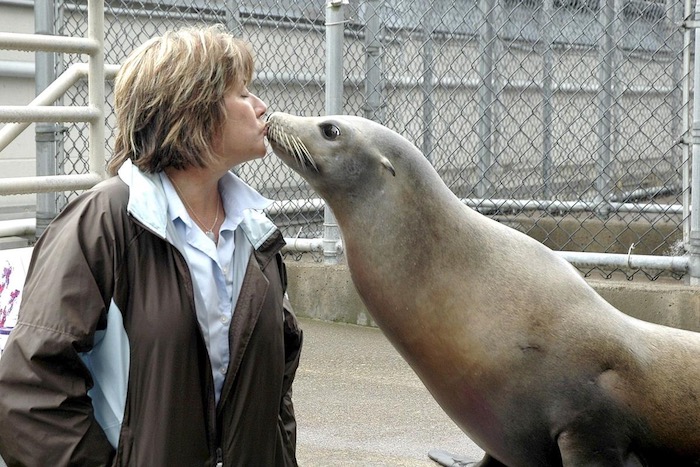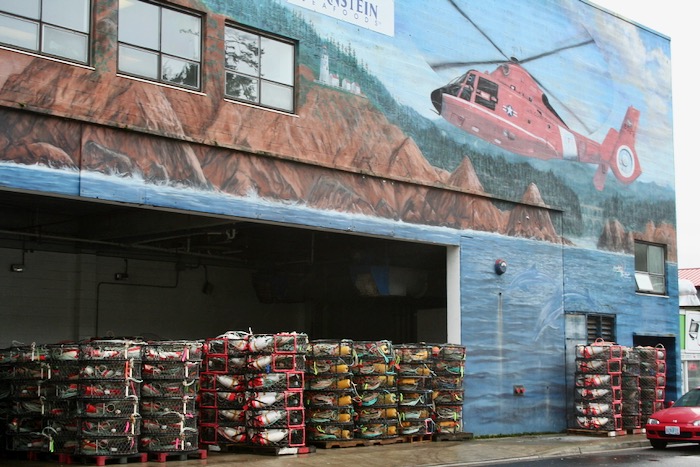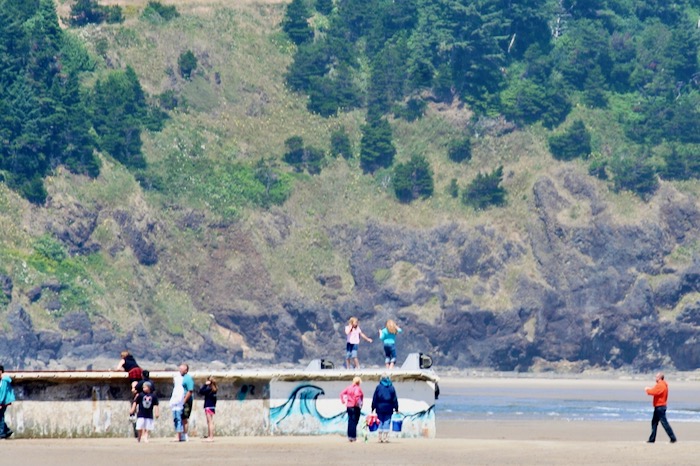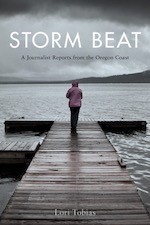Introduction: Journalist Lori Tobias arrived on the Oregon coast in 2000. After freelancing from Newport for several years, she signed on with the Oregonian as a stringer then staff writer, covering the entire coast—one person for more than three hundred miles.
Tobias’s story is as much her own as it is the coast’s, and she takes the reader through familiar beats of life—learning to live on and cover the coast, regular trips back east as her parents age, the decline of journalism in the twenty-first century—and the unexpected, often unglamorous experiences of a working reporter, such as a bout of vertigo after rappelling from a helicopter. Storm Beat tells a compelling story of a land that many visit, but few truly know.

by Lori Tobias
When I first signed on with the “Oregonian” there was a situation in a north coast town in which the volunteer firefighters walked off the job over the firing of their chief (by day, the public works director).
I called my editor to ask if it was a story for us – because now there was no firefighting crew. He said, “Lori, if someone dies, then it’s a story.”
He meant if there was a fire and no crews to fight it and someone died, that was a story.
Weeks later, the city manager who fired the public works/fire chief, committed suicide. I thought, you can’t make this stuff up. I knew then there was a story in the beat.

I Had to Cut some Stories I Would Have Liked to Include
The biggest mental challenged I faced when writing this book (Storm Beat)? Organizing a decade of material from reporter’s notes, journals, stories and correspondence, knowing what belonged, especially from my personal life, and what didn’t.
In truth, on the advice of some, I cut stories that I regret. In order for a story to make the cut, I decided there had to be something new, something the reader hadn’t known, something behind the scenes or in my personal life that added to what was already known from the news.
That meant cutting some stories I would have liked to include.

You Have to Believe In Your Work and Keep Sending It Out
I believe the biggest challenge with all writing is keeping the faith – especially in those early drafts when you are floundering and not sure you’ll ever find your way.
Then, finished, there are the rejections. You have to believe in your work to keep sending it out. If you don’t believe in your work, odds are no one else will, either. But if you believe in your work, but it is falling short, figure out why and fix it.
Why I Became a Journalist
Truthfully, from a very young age, I knew I wanted to write, but I was thinking books – fiction.
I got into journalism as a means of getting paid to write. I’ve always preferred an independent life and resisted punch-the-clock kind of jobs. Interestingly, newspapers offer a fairly independent existence in that if you make your deadlines and deliver good work, your editors will generally let you manage the hour-by-hour stuff.
Freelancing naturally appealed to me since we were traveling. In the early years, my husband was a “tramp” lineman and we could work wherever they needed linemen. I loved the lifestyle, but it certainly didn’t fit the average career.
How Journalism Has Changed Over the Years
The decline of journalism, as I call it, is fluid, so it’s hard to say where it is going.
In the last decade and a half, I’ve seen great, centuries-old newspapers fold. I’ve seen story space shrink, editorial interest diminish and outstanding, award-winning journalists lose their jobs.
The metro dailies are no longer as interested in the outlying areas.
Are younger readers still interested in daily news? Do people understand the role good journalists play in ensuring our democracy? Can/will news organizations pay journalists enough to make a career in the field worthwhile?
Those may be the some of the questions that decide the future of journalism.
Four Lessons I’ve Learned About Writing and Journalism
1. There is no substitute for time in the chair (Tom Jenks, founder of narrativemagazine.org, preaches this in his writing workshops centered around fiction and creative non-fiction, but I believe it applies to all writing).
2. Persevere.
3. Know your market and your subject.
4. Study the writers you admire and figure out how it is they do what they do.

I Learned to Be Very Careful Whose Advice I Take
[Writing this book] certainly gave me a sense of accomplishment, and once OSU Press signed on to publish it, it was a huge boost to my confidence as a writer and person.
I did learn to be very careful who I trust with my drafts and whose advice I take. Also, I tend to think everyone knows more than I do, and I learned that’s really not true.
Looking back, I’m kind of amazed at the wealth of history, information and institutional knowledge I’ve acquired and documented.
I Love Virtual Readings
Social media, interviews in any venue and virtual readings/events have been my most successful marketing techniques.
When my novel Wander was published, I discovered a huge streak of stage fright that was nearly insurmountable. I love virtual readings. It just feels natural to me.
That’s one of the silver linings for me of the pandemic.

Advice for a Young Writer or Journalist: Keep Learning
Persevere. Keep studying, keep learning, network and give generously to other writers, especially the new ones, who need all the advice and kindness they can get. I can’t begin to say how the support and mentoring by other writers has emboldened, inspired and encouraged me.
Finally, remember, there’s probably no better way to make money (other than to tell people you’ll show them how to lose weight) than to tell people you will teach them how to write, freelance, sell, market, etc.
Be aware, know what is being offered, if they can deliver it, if you need it and if you can afford it. I’ve had some great teachers, but I also learned a boatload from reading everything on writing I could and can get my hands on.
* * *
 Lori Tobias is a veteran journalist who freelances for local and national outlets, including the New York Times, Seattle Times, Denver Post, and 1859 Magazine.
Lori Tobias is a veteran journalist who freelances for local and national outlets, including the New York Times, Seattle Times, Denver Post, and 1859 Magazine.
Storm Beat is her first book of nonfiction; her novel Wander won the Nancy Pearl Book Award for Best Book of Fiction from the Pacific Northwest Writers Association.
She lives on the Oregon Coast with her husband Chan and rescue pups Luna and Monkey.
For more on Lori and her work, please see her website or connect with her on Facebook, Twitter, and Pinterest.
 Storm Beat: Journalist Lori Tobias arrived on the Oregon coast in 2000. After freelancing from Newport for several years, she signed on with the Oregonian as a stringer then staff writer, covering the entire coast—one person for more than three hundred miles. The job meant long hours, going out in the middle of the night for storms in wind and rain, floods, landslides and falling trees, and driving hundreds of miles in a day if stories called for it.
Storm Beat: Journalist Lori Tobias arrived on the Oregon coast in 2000. After freelancing from Newport for several years, she signed on with the Oregonian as a stringer then staff writer, covering the entire coast—one person for more than three hundred miles. The job meant long hours, going out in the middle of the night for storms in wind and rain, floods, landslides and falling trees, and driving hundreds of miles in a day if stories called for it.
The Oregon coast is a rugged, beautiful place known for its dramatic landscapes and fierce storms. Separated from the state’s population centers by the Coast Range, it is a land of small towns reliant primarily on fishing and tourism. Many of the stories Tobias covered were tragedies: car crashes, falls, drownings, capsizings. And those were just the accidents; Tobias covered plenty of violent crimes as well, including the infamous Christian Longo murders of 2001.
Tobias’s story is as much her own as it is the coast’s, and she takes the reader through familiar beats of life—learning to live on and cover the coast, regular trips back east as her parents age, the decline of journalism in the twenty-first century—and the unexpected, often unglamorous experiences of a working reporter, such as a bout of vertigo after rappelling from a helicopter. Storm Beat tells a compelling story of a land that many visit, but few truly know.
Available at Amazon.

